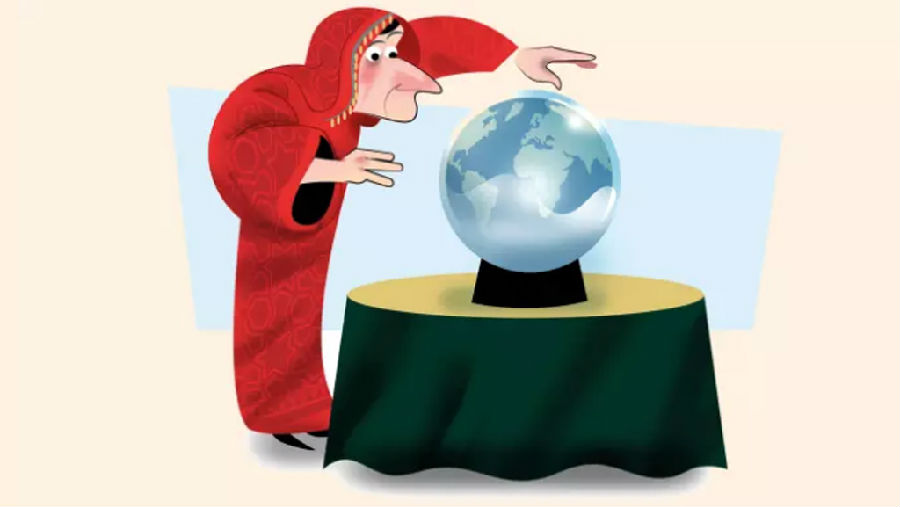(单词翻译:单击)
When Nassim Nicholas Taleb was a teenager in Lebanon in 1975, an ethnic civil war broke out. Locals were baffled. They had thought they lived in a “stable paradise”. Once the unforeseen catastrophe began, even Taleb’s grandfather, the deputy prime minister, “did not seem to know what was going to happen any more than his driver, Mikhail”, wrote Taleb in his 2007 classic, The Black Swan: The Impact of the Highly Improbable.
1975年,生活在黎巴嫩的纳西姆?尼古拉斯?塔勒布(Nassim Nicholas Taleb)十几岁时,一场民族内战爆发。当地人对此感到困惑。他们原本以为,他们生活在一个“安稳的乐园”里。塔勒布在他2007年的经典著作《黑天鹅:如何应对不可预知的未来》(The Black Swan: The Impact of the Highly Improbable)中写道,当这场谁也没有料到的灾难爆发时,甚至连塔勒布的祖父、当时的副总理“对于未来会发生什么似乎也不比他的司机米哈伊尔(Mikhail)知道的多。”
In 1940, when Daniel Kahneman was a Jewish boy living in Paris, the Germans invaded France. Kahneman’s family decided to stay put. Then came the Holocaust. While the family was in hiding, Kahneman’s father could not get treatment for his diabetes, and died. Kahneman was left wondering why humans fail to foresee catastrophe.
1940年,当丹尼尔?卡内曼(Daniel Kahneman)是一个居住在巴黎的犹太小男孩时,德国入侵法国。卡内曼的家人决定留下。接着犹太人大屠杀(Holocaust)来了。全家人躲了起来,但他的父亲因无法得到糖尿病治疗而死去。卡内曼开始思考为什么人类无法预知灾难。

Black Swan has just been reissued. Almost simultaneously, Michael Lewis has published The Undoing Project, about Kahneman’s intellectual collaboration with fellow psychologist Amos Tversky. Both books share an argument: people make bad judgments and terrible predictions. It’s a timely point. The risk of some kind of catastrophe — armed conflict, natural disaster, and/or democratic collapse — appears to have risen. The incoming US president has talked about first use of nuclear weapons, and seems happy to let Russia invade nearby countries. Most other big states are led by militant nationalists. Meanwhile, the polar ice caps are melting fast. How can we fallible humans avert catastrophe?
《黑天鹅》刚刚再版发行。几乎同时,迈克尔?刘易斯(Michael Lewis)出版了《思维解谜》(The Undoing Project)一书,写的是卡内曼与同为心理学家的阿莫斯?特沃斯基(Amos Tversky)的学术合作。这两本著作提出了一个共同的观点:人们会做出糟糕的判断和预测。这是一个及时的观点。发生某种灾难的风险(武装冲突、自然灾难、民主崩溃)似乎已上升。新任美国总统提到过首次使用核武器,而且他似乎乐于让俄罗斯侵略邻近的国家。多数其他大国由好战民族主义者领导。与此同时,极地冰盖正快速融化。我们这些容易犯错的人类如何能够避免灾难呢?
Today’s elites are often mocked for failing to foresee the financial crisis of 2008 but, in fact, such blindness is standard. In 1914, few people expected the first world war: the historian Niall Ferguson has shown that bond prices held up that summer, meaning that investors didn’t foresee higher government borrowing. Forecasters also missed the Holocaust, China’s Cultural Revolution and September 11.
如今的精英经常被嘲笑未能预知2008年的金融危机,但实际上,这种失明是司空见惯的。1914年,几乎无人预测到第一次世界大战:历史学家尼尔?弗格森(Niall Ferguson)指出,那个夏天,债券价格持续上涨,这意味着投资者没有预测到政府借款增加。预测者也没能预见犹太人大屠杀、中国文化大革命以及9?11恐怖袭击。
Our western generation is particularly ill-equipped to foresee catastrophes, because our countries have hardly experienced any since 1945. (We tend to forget our various close shaves with nuclear war, accidental and otherwise.) Now we are like Taleb’s famous turkey. Every day, he gets fed by a nice farmer. The turkey’s risk analysts make a forecast: based on past trends, he will keep getting fatter. Then, just before Thanksgiving?.?.?.?
我们西方这一代人尤其没有能力预知灾难,因为我们的国家自1945年以来几乎从未经历过任何灾难。(我们往往会忘记与意外或非意外核战争的各种擦肩而过。)如今,我们就像塔勒布书中那只有名的火鸡。它每天由一位善良的农民饲养。火鸡的风险分析人士预测:根据过去的趋势,它会不断变肥。接着,就在感恩节前……
How not to be that turkeyTaleb has some tips:
怎么才能不成为那只火鸡呢?塔勒布提出了一些建议:
You can’t know which catastrophe will happen, but expect that any day some catastrophe could. In Tversky’s words: “Surprises are expected.” Better to worry than die blasé. Mobilise politically to forestall catastrophe.
你无法预知哪种灾难会爆发,但可以预料到每一天都可能有某种灾难爆发。用特沃斯基的话来说:“意外是预料之中的。”担忧好于麻木地死去。要在政治上动员起来防患于未然。
Don’t presume that future catastrophes will repeat the forms of past catastrophes. The only catastrophes we seem able to imagine are ones that have happened before. After September 11, the US re-engineered itself to prevent another September 11. Now the cliché is that we’re back in the 1930s. Even Donald Trump, complaining about US intelligence agencies, asked, “Are we living in Nazi Germany?” However, we need to expand our imaginations. The next catastrophe may take an unprecedented form.
不要假定未来的灾难会重复过去的灾难形式。我们能想象到的唯一灾难似乎是之前发生过的灾难。9?11事件后,美国重新设计了自己,以防止另一起9?11事件。现在的老生常谈是,我们回到了1930年代。就连抱怨美国情报机构的唐纳德?特朗普(Donald Trump)都在发问:“我们住在纳粹德国吗?”然而,我们需要丰富我们的想象力。下一次灾难可能以前所未有的形式出现。
Don’t follow the noise. Terrorist attacks and Trump’s tweets are spectacular. But some catastrophes unfold silently: climate change, or people dying after they lose their jobs or their health insurance. (The financial crisis was associated with about 260,000 extra deaths from cancer in developed countries alone, estimated a study in The Lancet.)
不要跟随噪音。恐怖袭击和特朗普的推文引人注目。但有些灾难是悄悄演化的:气候变化,或者人们在失业或丧失医保之后死去。(《柳叶刀》(Lancet)杂志的一项研究估计,仅仅在发达国家,金融危机便与约26万的癌症死亡人数增加有关。)
Ignore banalities. Most westerners instinctively tune out serious news because they have learnt that it rarely affects their lives. In the US in particular, so-called “TV news” is, in fact, entertainment. It fixates on “stories” such as Trump’s spat with the actor Meryl Streep. But these distractions have become dangerous. We now need to stretch and bore ourselves with important stuff.
忽略无意义的东西。大多数西方人本能地不理会严肃新闻,因为他们习惯认为,这类新闻很少影响到他们的生活。特别在美国,所谓“电视新闻”实际上是娱乐节目。电视新闻主要关注“故事”,比如特朗普与演员梅里尔?斯特里普(Meryl Streep)的口水战。但这些消遣变得危险。我们现在需要扩展眼界,看一些重要的东西。
Strengthen democratic institutions. The only western state designed specifically to ward off catastrophe is the Federal Republic of Germany. Unelected German judges are charged with defending the constitution against the people, if necessary. By contrast, France now exists under an endless state of emergency. If Marine Le Pen becomes president in May, she’ll have a fairly free hand.
加强民主体制。唯一专为抵御灾难而设计的西方国家是德意志联邦共和国。非选举产生的德国法官肩负着必要时捍卫宪法不受民粹破坏的责任。相比之下,法国现在处于没完没了的紧急状态中。如果马琳?勒庞(Marine Le Pen)在5月当选总统,她将拥有相当大的自行决定权。
Strengthen the boring, neglected bits of the state that can either prevent or cause catastrophe. Examples are the collapsing dam in Mosul, Iraq, or the US’s ropy nuclear command centres. Eric Schlosser, author of Command and Control, reports that in 2013 the general overseeing the Minuteman III intercontinental ballistic missiles “was removed from duty after going on a drunken bender” in Russia, where his exploits included “asking repeatedly if he could sing with a Beatles cover band at a Mexican restaurant in Moscow, and insulting his military hosts”. A year later, nearly 100 Minuteman launch officers were caught cheating on their proficiency exams. Then a launch officer was jailed for 25 years for running a violent street gang. These people have the keys to launch nukes. A check-up may be in order.
加强政府中可能防止或导致灾难的平淡无奇、被忽视的部分。例子有位于伊拉克摩苏尔(Mosul)的即将坍塌的水坝,或美国的质量堪忧的核指挥中心。《命令与控制》(Command and Control)的作者埃里克?施洛瑟(Eric Schlosser)指出,2013年,管理“民兵3”(Minuteman III)洲际弹道导弹的那名将军因为在俄罗斯“当众醉酒”而被免职,他的“壮举”包括“在莫斯科一家墨西哥风味餐馆反复询问他是否可以跟一只甲壳虫翻唱乐队合唱,并侮辱军方接待人员”。一年后,近100名“民兵”导弹发射军官在能力考试中舞弊。接着,一名发射军官因为组织一个暴力街头团伙而被判入狱25年。这些人都掌握着发射核武器的钥匙。或许应该进行一项大检查。
Listen to older people who have experienced catastrophes. Taleb notes that elephant tribes often rely on elderly females to assess threats.
听听经历过灾难的老人的意见。塔勒布指出,象群经常依靠老年母象来评估威胁。
Be conservative. Many Americans hope Trump will “shake things up”. As Noam Chomsky says, the risk is that he will. Often it’s smarter to maintain a flawed status quo. In Taleb’s words: “Don’t mess with complex systems, because we don’t understand them.”
保持谨慎。许多美国人希望,特朗普将“改变现状”。正如诺姆?乔姆斯基(Noam Chomsky)所说,风险就在于他会这么做。很多时候,更明智的做法是维持有缺陷的现状。用塔勒布的话说:“不要乱碰复杂的系统,因为我们不懂。”
Stock markets hit all-time highs after Trump’s election. What could possibly go wrong?
特朗普当选之后,股票市场创下历史新高。可能是哪里出错了呢?


